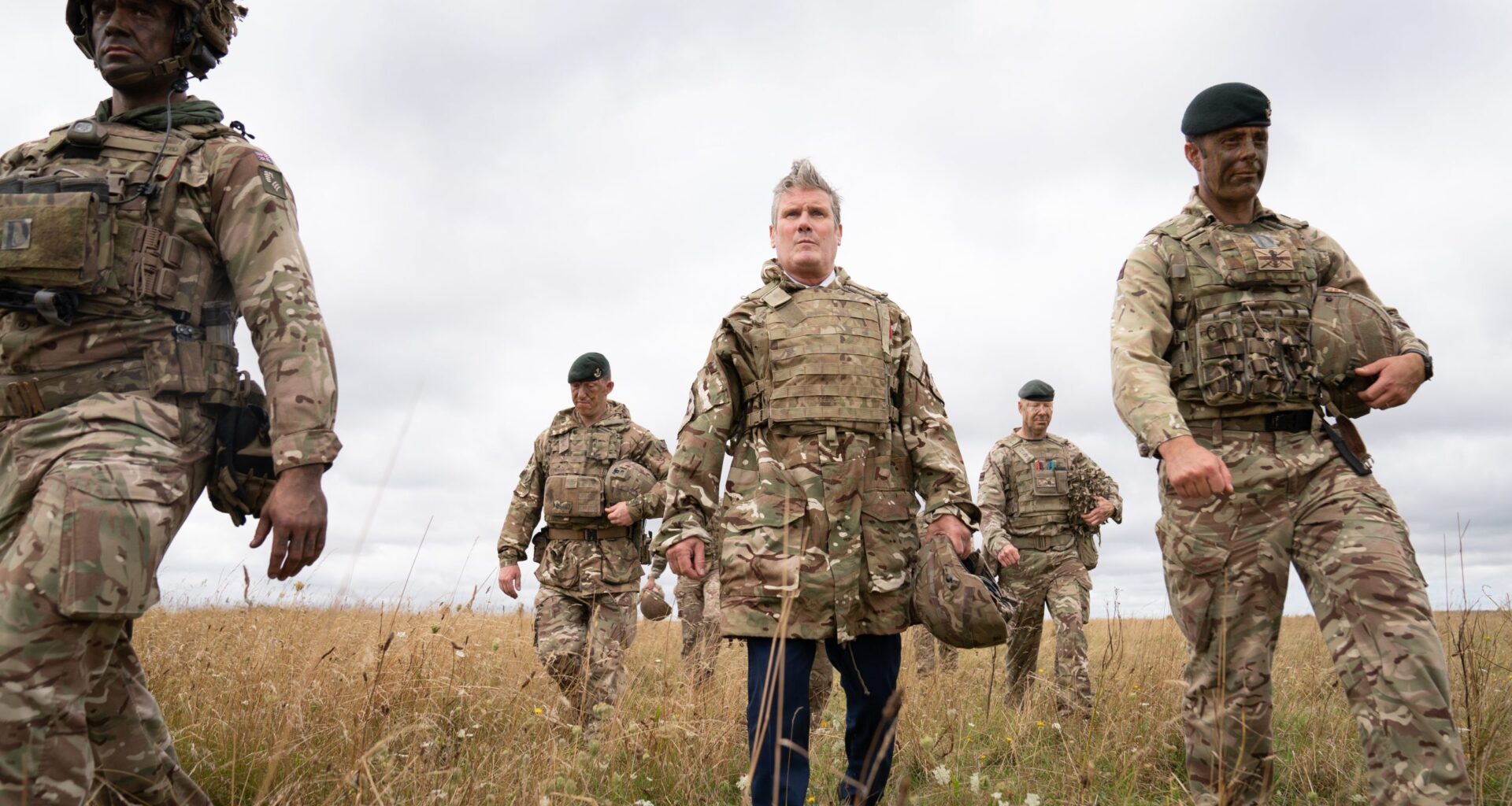Successive British governments have been walking backward towards rearmament. They know the world has changed, they know they need to bolster defense, yet all they can see is the warm glow of the post war-settlement behind them.
Like over-optimistic day trippers on English beaches, they are wearing too little too late in the season, and now stand shivering and near-naked as icy gusts of realpolitik whip across the dunes.
Last week, Vice President JD Vance and President Donald Trump, like not altogether friendly magicians, spirited away confidence in the US defense umbrella that has sheltered Western Europe since 1945. One moment, it was there, and the next gone, just like that.
Yet anyone observing international relations over the past decade cannot be truly shocked — it is not as if US realignment away from the Euro-Atlantic towards the Asia-Pacific region had not been telegraphed for a decade by Obama, Trump, and Biden, nor that Trump’s preference for Putin’s oligarchic-autocracy over Zelenskyy’s Euro-liberalism had not been made brutally clear in numerous interviews.
Rather British political leaders preferred to simply disbelieve these signals because they could not bring themselves to contemplate the evaporation of the basic assumptions to which Britain and NATO’s defenses are anchored.
Previous UK government strategic defense reviews (SDRs) have justified maintaining the radical post-Cold War retrenchment of the UK’s armed forces by pointing out that they would only plausibly fight as part of the NATO alliance.
Even now “NATO first” is the technocratic strap-line that frames the terms of reference for the current 2024-2025 SDR, due to be published this spring or summer (the aftershocks of the new administration’s quickfire, Eurosceptical statements are making the authors’ job extremely difficult and publication dates are shifting.)
NATO is nothing without absolute trust that NATO members — especially its hegemonic member, the US — will implement Article 5 if one inch of NATO territory is violated. That infinite trust has now been broken by President Trump, and Vladimir Putin knows it. It is this realization that forced Keir Starmer to turn and face directly into the geopolitical maelstrom in mid-February (regardless of the UK’s dire public finances.)
Up to that moment, the debate about UK defense has not been what we can call grand strategic. Rather is has focused on largely operational and technical concerns about what capabilities the UK could contribute to US-led NATO strategy.
As the US umbrella was apparently removed last week — and the fictitious “special relationship” with it — UK defense became, once again, what it was always before 1945 — the primary and most existential concern of government, one requiring deep grand strategic thinking and significant resources, and one which if not properly conceived or resourced could result in a descent towards general war or equally damaging coercion of Britain and her allies by rapacious adversaries.
Get the Latest
Sign up to receive regular emails and stay informed about CEPA’s work.
Until 1964, Britain’s defense Grand Strategy resided in the Admiralty. The Admiralty pursued the national maritime strategy of a great naval power until it became anachronistic in that decade.
By then NATO had become the strategic focus, and NATO strategy was US-led. The Admiralty and its capacity for national defense strategic thinking was subsumed within a civil service-led Ministry of Defence, primarily concerned with managing government personnel and assets. Strategic thinking, such that it was, moved to NATO in Brussels, and ultimately to the Pentagon.
Subtly, the intelligence estate and special forces became much more important in shaping and achieving the remaining non-NATO national strategic defense and security objectives: in Northern Ireland, Africa, and the Middle East. Briefly, the ghost of the Admiralty was dug up and dusted off during the 1982 Falklands War, but the shift in strategic emphasis to the intelligence services and special forces accelerated again after 1990 and especially after the terrorist attacks on 9/11.
The events of February 2025 are signaling the requirement for significant change. Not just a rapid increase in the defense budget to hide our evident nakedness — perhaps back towards Cold War levels of 5% of national wealth, or more — but a revival of our ability to develop and implement a truly national defense strategy.
This means crafting and leading a family of new alliances with our European friends and other like-minded governments, which are being coerced and isolated by Moscow, Beijing, and, yes, Washington.
The US’s decoupling from liberal democratic Europe and embrace of transactional and acquisitive foreign policy regardless of international norms leaves a void in the leadership of the West, which Britain, France, and the EU will need to fill, working with new partners like Ukraine.
These new strategic partnerships will be with peers rather than a superpower capable of sheltering us from global storms, and that means we also need to lead on military grand strategy and craft our defense review to build these new partnerships and an industrial base to support them.
Relying on the goodwill and integrity of US-led defense strategies appears reckless, in the short term at least. Even if US membership and leadership of NATO continues, it would be foolish to put the same level of trust in Article 5 that we have been taking for granted.
From this point forward, we need to begin thinking and planning like a great power once again because if we don’t, nobody is going to do it for us, and we will be exploited or worse by our adversaries and perhaps by our erstwhile friends.
While Starmer may have waited far too long to react to the Arctic winds of the populist world order, we must now grasp the opportunity for strategic leadership with both hands, relearn how to design and implement a complete and effective military strategy and recruit the partners we need to redress the balance of power and deflect the icy blasts of a more perilous world.
James Fennell MBE, Fellow of the Royal Geographical Society, is an international peace and security expert and was Director of the UK FCDO’s flagship stabilization program in Ukraine from 2022-24. Since leaving the Royal Navy he has spent 30 years as a senior executive and government adviser on conflict and security policy in Africa, Asia, and the Middle East for FCDO and international organizations. In 2012 he was awarded an honorary research fellowship by the University of Birmingham in peace and security.
The views expressed here are entirely his own and do not reflect the opinions of any agency or government.
Europe’s Edge is CEPA’s online journal covering critical topics on the foreign policy docket across Europe and North America. All opinions expressed on Europe’s Edge are those of the author alone and may not represent those of the institutions they represent or the Center for European Policy Analysis. CEPA maintains a strict intellectual independence policy across all its projects and publications.

Date: June 5, 2025
Time: 9:00 am to 12:00 pm CET
Europe’s Edge
CEPA’s online journal covering critical topics on the foreign policy docket across Europe and North America.
